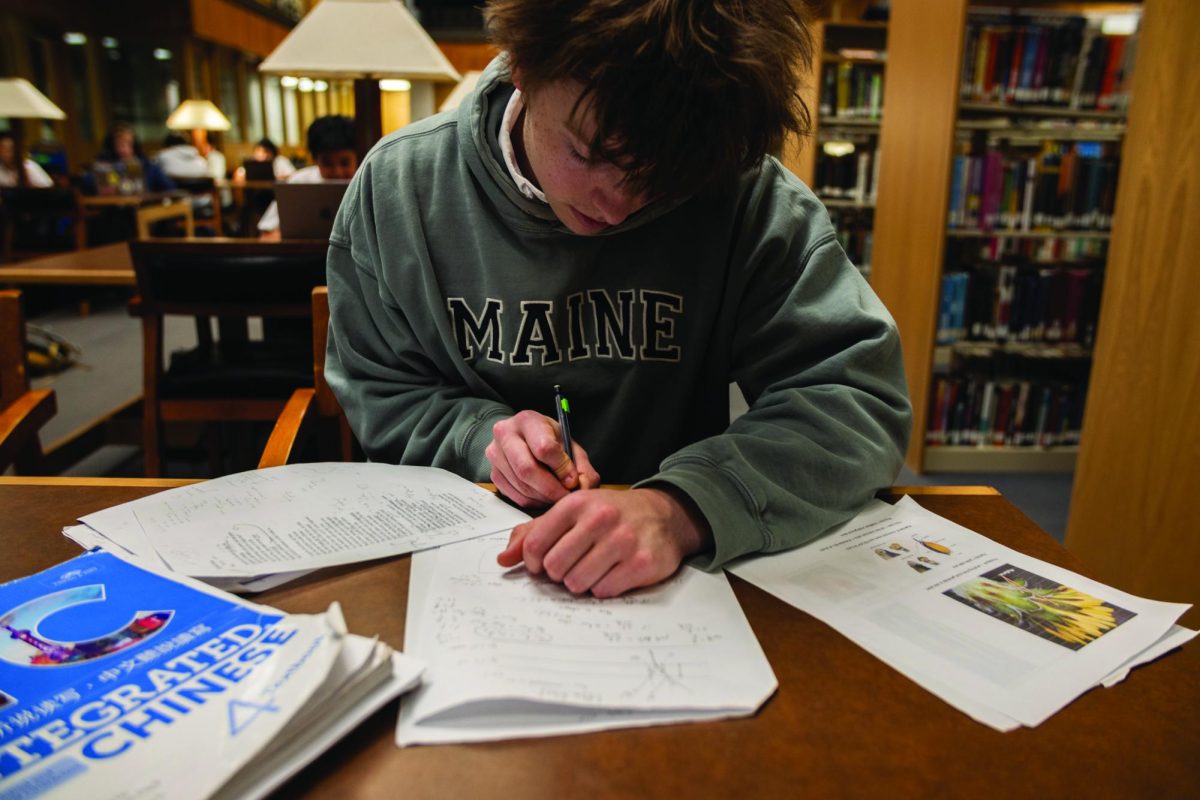
Photo by Winston Lin
Junior Benjamin Standefer works on a multitude of subjects, giving attention to different areas of his study.
It’s not about learning, I just need to keep my grade. I’m going to be a doctor, I don’t need to pay attention in my math class.
Having already decided his future career path, the student decides to only focus on attaining a high grade in his classes–neglecting to learn crucial information and instead cram information into his short term memory to score well on tests. He keeps up this cycle, pumping information into his brain and dumping it shortly after his tests to make room for another “unimportant” subject.
As the college admissions process becomes more and more competitive, many students feel pressured to develop a deep passion for a particular subject at an early age to create a strong college application in hopes of scoring acceptance to an elite college. By closing themselves so early, they often begin to view certain classes as obstacles in their journey and something that they just have to get a good grade in and not learn the material.
Malcolm K. and Minda Brachman Master Teaching Chair Martin Stegemoeller believes that the term “renaissance man” has several meanings–stretching from the creative inventors of the classical Roman and Greek periods to a person who strives to return to these values.
“A renaissance man now means somebody who’s like a polymath, and they’re good at a lot of different things,” Stegemoeller said.
Through the changing landscape of college admissions and artificial intelligence, Stegemoeller feels like the place for individuals who are well-versed in a variety of topics is disappearing–and it is a problem.
“It’s a problem if you have a kid who begins to pick up as a young boy that school is about getting into college,” Stegemoeller said. “And getting into college requires you to have a specialty where you win to show that you’re better than others, so that a college will take you to be an expert in that thing, whether that’s football or robotics or whatever. You’re gonna have a lot of kids who are just kind of ‘zombieing’ through the rest of their classwork.”
In order to solve this problem, Stegemoeller believes that if educational institutions shift priorities to an approach to promote learning first, students will pay more attention and try to actively retain the information that they are learning in class.
“ I think if we figured out a way to assess kids on longer term retained knowledge they would approach learning in a way where they would retain knowledge,” Stegemoeller said. “And if they knew that the six months after a course, without any warning, they could be asked to explain something (from the course) and that if they explained it that would be recognized somewhere on a transcript, I think they would respond.”
With colleges and universities searching for specific areas of interest that are prevalent in an applicant’s extra-curricular and courses, the conventional ‘renassaince man’ is becoming more and more rare. However, some students still choose to engage in a variety of activites rather than focusing on one specific area.
Junior Ben Standefer is one of these students that still sees the value in expanding one’s area of expertise.
“With our community at St. Mark’s we are exposed to many different opportunities and experiences,” said Standefer, “and I think that while I am here I should take advantage of those opportunities.”
Despite Standefer believing that he has a career path ahead of him that he is interested in, he still does just as much outside of that field as he deos in it.
“I do see my self continuing to pursue STEM after high school,” Standefer said, “but I also think its important to have a variety of experiences, especially in leadership, that build character.”
Standefer is on the Community Service Board and has also started several service oriented non-profits. One of the companies that he created is called Binary Tree, it is a non-profit that provides coding lessons to young adults in Africa who are interested in developing code and programming but have not had access to proper education.
“I started Binary Tree about a year ago and now there’s around 30-40 students around the country who work with the orginization,” said Standefer, “We design curriculum and organize fundraisers around the country.”
Standefer’s wide variety of activities both within and outside of St. Mark’s have given him new insights and advantages that he can use for the future, whether it be in college or much later in life.
“I think being a Renaissance man now puts you in a position to combine those interests in ways that maybe other people haven’t thought to do,” Standefer said. “Stepping into leadership roles in other groups have helped me in other capacities, and I’ve learned some really great skills.”